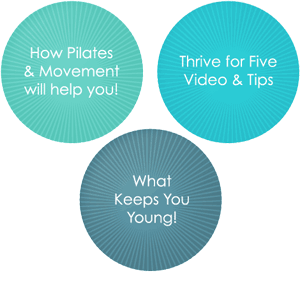The Case for Moderate Exercise: Fighting Menopause and Burning Fat
By Jenny Kornfeld On April 16, 2015 · Leave a Comment
I frequently hear about the newest thing in fitness: either an at-home training program, a new approach to the same old exercises, or a new, hip class offered at all the gyms. For the most part, I notice one theme carried throughout these new workout trends: harder is better!
Is this true? Are there any benefits to a moderate workout? Yes!
Fighting Menopause
If we have not personally experienced menopause, we have no doubt seen the effects of it. From the annoying symptoms, such as hot flashes and poor sleep, to the serious health problems, such as osteoporosis, depression, obesity, and cardiovascular disease, menopause can cause quite an interruption to one’s health and happiness. What to do? Exercise has proven to be very successful in regulating these symptoms.
 Many people are under the impression that if exercise is effective in combating menopause symptoms, then higher intensity and more frequent exercise must be even more effective. However a few recent studies show evidence to the contrary. Low intensity workouts were the least effective, followed by high intensity workouts, leaving moderate workouts to be the most effective in fighting menopause symptoms, especially mood!
Many people are under the impression that if exercise is effective in combating menopause symptoms, then higher intensity and more frequent exercise must be even more effective. However a few recent studies show evidence to the contrary. Low intensity workouts were the least effective, followed by high intensity workouts, leaving moderate workouts to be the most effective in fighting menopause symptoms, especially mood!
Specifically, Pilates has been cited as particularly useful in fighting menopause symptoms. The mindful movement helps fight stress and poor moods while the resistance training effectively builds bone density in the fight against osteoporosis. Of course, these specific benefits apply to anyone of any gender and age!
Burning Fat…Safely
Interval training is a high-intensity approach to cardio that involves working at a high heart rate for a few minutes followed by a short recovery period at a lower heart rate and repeating this cycle a few times.  It allows the body to burn a lot of calories in a short amount of time. Many new workouts are based on this approach, but also take it to an even higher intensity level.
It allows the body to burn a lot of calories in a short amount of time. Many new workouts are based on this approach, but also take it to an even higher intensity level.
Does interval training work? Simply put, yes. But what of moderate exercise? Is it of any benefit?
Studies have shown that working at a moderate heart rate for at least 1.5 hours a few times a week can significantly increase the body’s fat-burning ability. While I agree that a shorter bout of high intensity cardio is much more convenient than an hour or so at a moderate intensity, I also see much less pain and injury in clients that work out at moderate levels. These two approaches have potential to complement each other well. I try to incorporate at least one longer bout of moderate cardio a week.
A well-rounded and varied approach to your workouts and health will yield the best results, so don’t underestimate the unique value and benefits of a moderate workout.
What fun and unique workouts do you incorporate into your life? Share with our readers here!

